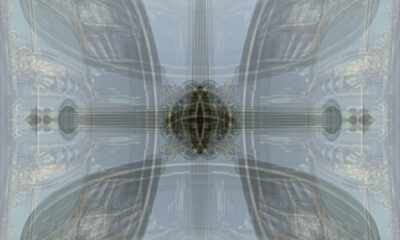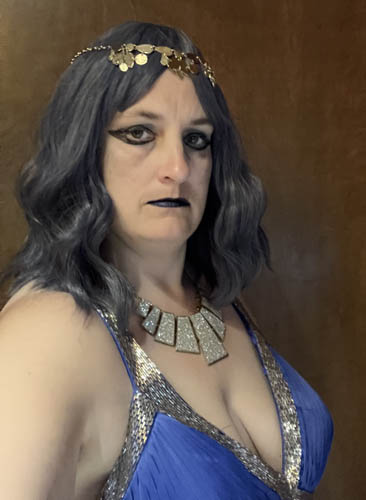
Freak Out, a Rocky Horror Memoir by Jennifer Weigel
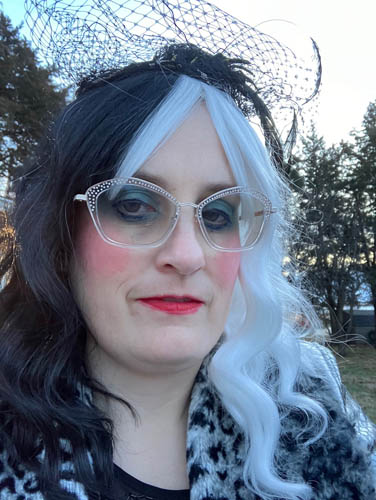
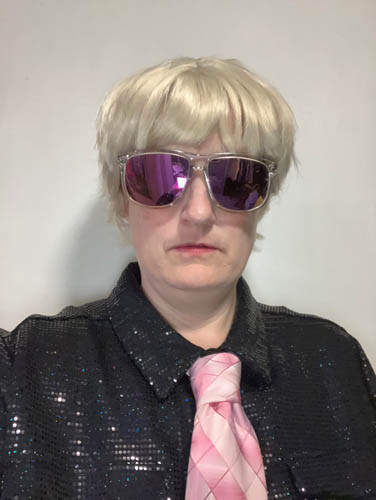

So I can’t believe I’m writing about Rocky Horror Picture Show, because this movie used to be such a huge phobia of mine. I know that this probably seems weird, or at least over-reactionary, but it has to do with a particular incident from my youth.
When I was growing up, late-elementary-school-ish (the exact timing when this happened isn’t as important as how), my dad and stepmom were watching the film with a couple of friends of theirs who had come over for dinner and to visit. All the adults were draped over various living room seating glued to the oversized television.
This wasn’t atypical, and my stepsister and I would pass through on occasion as the adults were watching movies. Sometimes we’d flop around ourselves and join in the voyeurism. Movies were my father’s life, they offered up some alternate reality in contrast to his illness, which kept him housebound. So the television was always on, either as a focus or as background noise. Mostly campy B-rated sci-fi movies abounded with other weirdness and pop culture thrown in.
But in this particular incident, the adults were engaging with the Rocky Horror movie itself, even more than the usual pun-induced banter. They all acted all together in response to certain scenes, in an orchestrated way, as if they were part of the script. The result was both alienating and a little frightening, like some in-crowd joke that I was too young to understand, and from what little I caught of the screen, said joke seemed to be of a sexual nature.
So I was avoiding the entourage, a bit more than usual, while also trying to catch glimpses of whatever it was that had their attention. You know, passing through the living room en route to the kitchen for a glass of tea, or another, or to use the bathroom, or looking for one of the cats to bother… the usual kid lurker stuff.
I happened to be thusly passing through the room when the scene of Rocky’s creation captured my attention. Between seeing his half-naked, gold spandexed frame playing off of Frank N Furter’s gender-bending glory, I was entranced. I stood there bug-eyed, mouth agape, and just stared. That is, until my parents’ friend pointed me out for it, directing all the eyeballs in the room to rest upon me in my bewildered strange sexual awakening.
I was horrified. I instantly retreated from the room and made a mental note to never ever watch the film under any circumstances, so as to not appear so hypnotized by whatever it was that had captured me. For. Over. Twenty. Years. Despite posing nude within my figure-drawing group, making artworks utilizing my own menstrual blood as media, and showing my works in erotically charged and socio-politically themed exhibitions. That particular movie remained off-limits.
Fast forward… a photographer friend of mine was giddy with anticipation. Her son was going to be playing Frank N. Furter in the live action version of the film at the local community college and she was inviting everyone she knew. She got me two free tickets, and good seats at that. I had to overcome my irrational childhood fear. I had to give myself over to my vulnerability.
I don’t remember much of the show itself except that my fears were irrational and I rather enjoyed it. My friend’s son did a brilliant portrayal, capturing the character beautifully. The show was totally up my alley based on my sense of humor, spectacle, and love of 4th wall breaking cinema and writing. It was an experience, and a pleasant one at that.
There was even a young girl in attendance, of about the same age I had been when I first encountered the film, there with her parents and gleefully part of the proceeding. Her parents explained that Rocky Horror Picture Show was her favorite movie, and I could easily picture myself as that girl in another time and place. It wasn’t even a stretch considering the fact that I had a thing for Tim Curry and my favorite movie was Clue.
And, even more importantly, it got me talking to my partner about sexual fantasies, fears, and vulnerabilities, which sparked a sexual awakening in our relationship in ways we had not previously known that stayed with us for months afterwards. In fact, it nearly saved our marriage (though sadly it was doomed to fail due to our having grown apart spiritually and emotionally, and no amount of physicality was going to repair that).
So I guess I’m writing this to point out the incredible power of Rocky Horror Picture Show and its ability to redefine gender and sensuality according to its terms. This is the energy that I want to embrace, to encourage, to nurture in some of my own work. For in the flicker of the cinematic circumstance, we can emerge from our own vulnerabilities to express our true selves on our own terms. We can shiver with anticipation as we open up the time warp into our own wants and desires, to eschew traditions and roles that we never felt connected with. And we can revel in sharing that experience with others who feel need to do the same.
The photographs are from more costume-based figure modeling sessions, but I thought we may as well do the Time Warp again again while we’re here. If you want to see some of the previous posts featuring identity costume art, here’s Time Warp 1 and Rock-y the Vote 2… Or feel free to read my other personal essay about The Spooky Dentist…
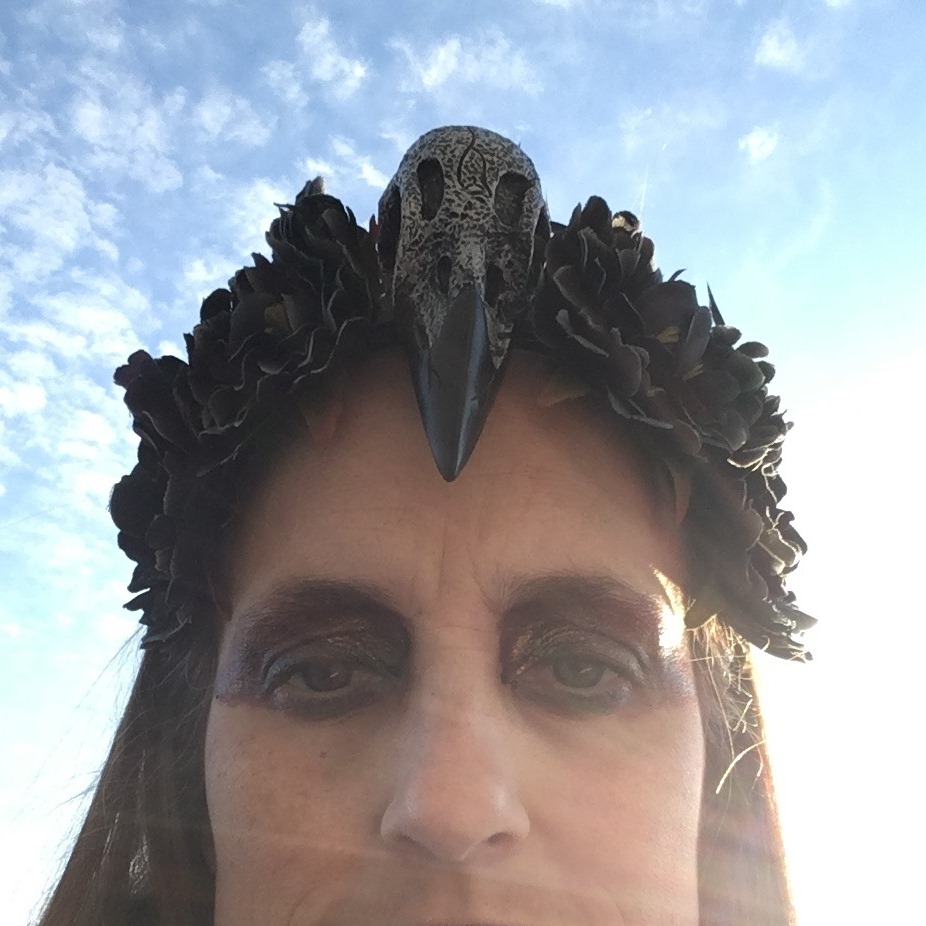
And feel free to check out more of Jennifer Weigel’s work here on Haunted MTL or here on her website.
Movies n TV
Wheel of Time A Question of Crimson Is a Political Espionage Delight
Episode two of Wheel of Time felt like the beginning of a long journey. Stories are unfolding, lives are changing, and blood is spilling.
Let’s discuss.
The story
We begin this episode in the past with Elayne’s mother, Queen Morgase. It turns out her rise to the throne was a bit, shall we say, cutthroat. So when she shows up at the White Tower, Siuan is concerned.
She might have reason to be, too.
Meanwhile, Rand, Egwene, Moiraine, Lan and Aviendha are in the Spine of The World. As they travel through some of the most breathtaking lands I have ever seen on a TV show, Egwene is plagued with nightmares. We think at first that’s just her trauma working itself through her system. But we soon find out that it might not be that straightforward.
Finally, Perrin returns home to heal after his hand is almost cut in half. But when he gets there he finds the town has been infested by Children of The Light. And they’re looking for him.
What worked
There was something heartwarming in this episode about political espionage and choking religious persecution. And that is Elayne’s relationship with her family.
I have consumed a lot of fantasy content with royal families. And I have never once heard a princess call her mother ‘Mum’. I’ve never seen royal siblings get along. And I have sure as hell never seen a princess have a good relationship with her step-parent.
This was refreshing. Even though Queen Morgase is kind of a horrible person she seems like a good mother. And that’s an unexpected delight.

Of course, this is just one storyline among many. And while this can sometimes be overwhelming, in this case it wasn’t.
I’ll be honest, some of these storylines are going to drag for me. I know this because I’ve read some of the Wheel of Time books and I have an idea that not all the characters exactly pique my interest.
No one likes all the characters. No one likes all the storylines. While I am here for the political espionage between Queen Morgase and Siuan, not everyone likes it. While others might be fascinated with Selene trying to win Rand back, I couldn’t care less.
Having multiple storylines keeps everyone’s attention better. So long as things don’t get out of hand. Things can easily get out of hand. But this seems to be managed well.
So far.
What didn’t work
As I mentioned above, I’m not thrilled with Rand’s story at this point. And while it’s fine to not like a storyline when there are this many to choose from, it’s not fantastic that the one I like the least is the one involving our two main characters. And anytime we were with the team at the Spine of The World, the only thing that brought me joy was Moirain’s hat. It reminded me of Stockard Channing’s hat in Practical Magic.
The problem is that Rand is Charlie Brown with controversial magical powers. He is boring, serious, and pessimistic.
And yes, I understand that he has a heavy emotional burden and he’s the Dragon Reborn and that’s quite taxing and all. But let’s be fair, there isn’t a single person in this show that doesn’t have a heavy burden. And most of them manage to be fun occasionally.

All that being said, this episode of Wheel of Time did exactly what it needed to do. It set up conflicts at each of the three locations. It established emotional ties between the characters and the events. And it established goals for everyone.
This was, in short, a solid episode. Not groundbreaking, not mind-blowing or life changing. It was simply good. It was entertaining and moved the plot forward.
Well done.
 (3.5 / 5)
(3.5 / 5)
Movies n TV
Wheel of Time Returns With A Bang
Wheel of Time is back for season three. There are mixed feelings regarding this. Last season, there were some serious pacing issues. And some serious sticking to the book’s storyline issues. But we’re two seasons in, and we don’t give up so easily. So let’s dive into episode one, To Race the Shadow.
By the way, I highly recommend watching this episode with the subtitles on. You’ll see why.
The story
We begin this episode with Liandrin facing a trial of sorts for her rampant betrayal. She does her best to gaslight her Aes Sedai sisters into thinking that Siuan Sanche is the real traitor.

When that doesn’t work, she reveals how many Black Aes Sedai have actually infiltrated the tower.
Spoiler, it’s a lot.
In the aftermath, our whole team gathers to drink and enjoy one night of relaxation before they head out to the Tear to form an army for Rand. All is going well until they’re attacked by myriad creatures and a sentient axe.
What worked
This episode was long. It had a run time of an hour and eleven minutes. And a lot of that run time was spent in heavy dialog scenes.
Fortunately, these were well-done scenes.
If you’re going to have a lot of talking scenes, there are good ways and bad ways to do it. Last season, we saw lots of examples of the bad way to do it. But this episode did it well. For one thing, other things were going on while conversations were taking place. The characters are drinking, playing games, walking through an interesting city. And the scenes themselves didn’t stretch out. They weren’t repetitive. We heard what the character had to say, then we moved on.
It was also nice that the point of these scenes wasn’t just info dumps. We had character development. We had romantic interactions. We had plot development and foreshadowing.
Overall, this episode felt like what it was. A moment of calm before a storm.
Taking a step back, I’d be remiss if I didn’t address the fight scene at the start of the episode. Because it was epic.
The magic looked amazing. The martial arts that went along with it looked fantastic. The costumes were beautiful. It was just incredibly fun to watch.
More than that, it was emotional. We lost some characters in that fight that were important. And it was clearly emotionally shattering for many of our characters, who found themselves betrayed by people they trusted.
So many of them.
It was a great way to open the season.
What didn’t work
Despite that, this episode wasn’t without its flaws.
First off, there were a lot of dialog scenes. And they were good scenes, as I’ve already discussed. But it was one after another after another. And when your episode is, again, an hour and eleven minutes, it’s maybe a little much to have so much chit-chat. Couldn’t some of these conversations, important as they were, have been moved to maybe another episode?
Finally, I want to talk about Egwene’s travel through the arches.

I feel like maybe there were some deleted scenes here. Because there must have been more to that visit than what we saw, right?
We could have seen Egwene battle Rand. That would have been badass and emotionally devastating. We could have seen her with a quiet life with Rand back home at the Two Rivers. We could have seen anything except for the quick clip of Rand in a bloody river, followed by Egwene being shoved back out in a bloody shift.
Bad job. But at least it wasn’t an extended scene of Moiraine collecting bathwater, and then taking a bath while looking sad. If we’d started this season with another scene like that, it might have broken my brain.
Amazon dropped the first three episodes at once. So we’ll be back soon to talk about episode two. See you then.
 (4 / 5)
(4 / 5)
Movies n TV
Entertaining as hell: Eight Legged Freaks (2002) Review
Early 2000s is a special era for the industry. It accepts the cheesiness and corniness of movie making, in turn producing some gems in their own right. Eight Legged Freaks starring David Arquette and young Scarlet Johanson is a horror comedy about giant spiders who overtake a small town. As crazy as that premise sounds, the movie surprisingly has a ton of heart and is super entertaining. Let’s review, shall we?
Plot
We start Eight Legged Freaks with a shot of toxic waste spilling into the water supply of Joshua, a spider farm owner. He is friends with Mike, one of our protagonists, who is a science geek and a spider enthusiast. Mike notices something quite right upon visiting Joshua, but no one takes him seriously. We are then introduced to the rest of the crew. Mike’s mother Samantha, the town sheriff, is too busy chasing Ashley, his sister, who is dating the town mayor’s son Bret (something Samantha does not approve of). We also have Chris, who returns to the town to save his father’s legacy in the town mines. He has opposition from Wade, Bret’s father, who wants to use the mines for his business ventures. Lots of drama going on that will only get juicier once the spiders get loose.
The creepy crawlies quickly dispose of Joshua and make their grand appearance after Ashley rejects Bret’s advances, abandoning him in the middle of a desert. A glorious chase sequence ensues as the spiders make their way towards the town, wreaking havoc on its residents. In a true horror fashion (which the movie acknowledges), it takes some convincing from Mike and then from Samantha for the town to take the threat seriously. The tongue-in-cheek style of narrative adds the comedy aspect to a movie that would otherwise burn out fairly quickly.
The remaining characters hide out in a shopping mall as it’s the only somewhat sturdy building in the area. This doesn’t last long as the spiders break in, forcing them to run through the mines. Their resources to fight the creepy crawlies off are limited as the methane gas doesn’t allow them to use firearms. Such conditions require resourceful thinking from Chris, who uses perfume to fend off the leader of the spider group and save himself during the climax of the movie.
Character dynamics are not forgotten once the action kicks in. We have Chris confessing his long-term feelings for Samantha which she knew all along, which provided some comedic relief. Bret also reunites with Ashley and apologises for being an asshole. Mike finally gets the appreciation he deserves as his knowledge saves the townsfolk more than once during the whole ordeal.
We end the movie with the town’s radio show person telling the story as an urban legend during his segment. This brings it into question – how much of it happened the way he said it did? We can only guess…
Overall thoughts
Eight Legged Freaks is a fun creature feature with some self-aware commentary on genre tropes that doesn’t take itself too seriously. The acting is good, the pacing fitting and the characters are likeable enough for you to want them to make it through. Definitely a must watch, if you don’t suffer from arachnophobia, that is.
 (5 / 5)
(5 / 5)








